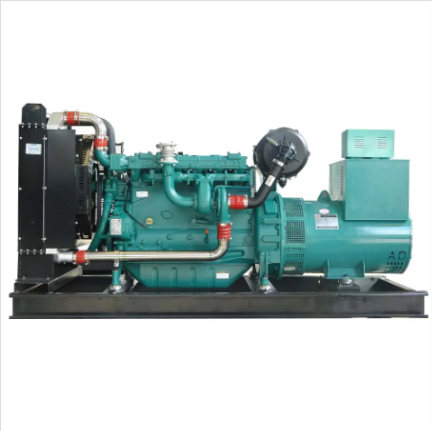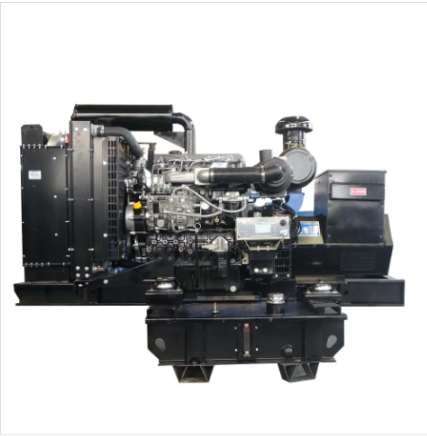Jenis Utama dari Generator listrik dan Perbedaan Inti Mereka
Generator Portabel: Mobilitas dan Solusi Sumber Daya Sementara
Generator portabel dibuat agar bisa bergerak dengan mudah, menjadikannya sangat cocok untuk acara di luar ruangan seperti pesta, petualangan berkemah, atau saat terjadi pemadaman listrik tak terduga di rumah . Kebanyakan generator ini berjalan dengan bahan bakar bensin dan menghasilkan daya antara 1.000 hingga 10.000 watt. Daya keluaran sebesar ini biasanya cukup untuk mengoperasikan peralatan dasar seperti lampu, kulkas, atau alat perkakas listrik bila dibutuhkan. Banyak model saat ini dilengkapi dengan fitur keselamatan seperti penghentian otomatis jika tingkat oli terlalu rendah, membantu mencegah kerusakan selama generator beroperasi. Namun ada satu hal penting yang perlu diingat orang tentang generator portabel. Menurut Electrical Safety Foundation International (ESFI), setiap tahunnya ada orang yang meninggal karena tidak mengoperasikan mesin-mesin ini dengan benar. Jadi selalu baca terlebih dahulu manual sebelum mencoba menghidupkan atau memberi daya pada perangkat apapun.
Pembangkit Listrik Cadangan: Cadangan Otomatis untuk Sistem Kritis
Generator cadangan berfungsi sebagai sumber daya cadangan otomatis yang aktif ketika terjadi pemadaman, menjaga aliran listrik tetap berjalan tanpa memerlukan tindakan manual dari pengguna. Sebagian besar model beroperasi dengan bahan bakar gas alam atau propana yang membuatnya lebih mudah digunakan dan sebenarnya lebih ramah lingkungan dibandingkan opsi diesel lama yang pernah populer di masa lalu. Pemasangan dan pemeliharaan generator ini agar tetap dalam kondisi kerja yang baik memerlukan bantuan profesional dari teknisi yang terlatih. Waktu dan biaya yang dikeluarkan untuk instalasi yang benar benar-benar terbayarkan dengan pasokan listrik yang andal, terutama penting bagi properti residensial, usaha kecil, dan lokasi di mana pemadaman listrik sama sekali tidak bisa terjadi. Komisi Keselamatan Produk Konsumen Amerika Serikat mencatat bahwa rumah dengan generator cadangan mengalami jauh lebih sedikit gangguan layanan, sebuah aspek yang sangat penting di rumah sakit dan fasilitas medis lainnya di mana bahkan pemadaman singkat sekalipun bisa menyebabkan masalah serius.
Pembangkit Listrik Inverter: Energi Bersih untuk Elektronik Peka
Generator inverter menghasilkan tenaga yang lebih bersih dengan gangguan lebih sedikit, itulah sebabnya mereka bekerja sangat baik dengan perangkat elektronik sensitif seperti laptop dan ponsel yang tidak tahan lonjakan tegangan. Dibandingkan generator biasa, model ini cenderung jauh lebih tenang saat beroperasi, apalagi banyak model yang bisa beralih antar bahan bakar tergantung ketersediaan saat itu. Kita berbicara tentang mesin yang cukup kecil untuk dimasukkan ke dalam ransel namun cukup bertenaga untuk memenuhi sebagian besar kebutuhan luar ruangan, sesuatu yang membuatnya sangat populer di kalangan orang-orang yang suka berkemah atau menghabiskan waktu di acara olahraga. Riset pasar menunjukkan tren ini juga tidak melambat. Menurut angka terbaru dari Technavio, penjualan diperkirakan akan terus meningkat sekitar 6% per tahun hingga 2025, menunjukkan betapa tingginya permintaan terhadap stasiun daya kecil yang serbaguna ini.
Pembangkit Listrik Industri: Kapasitas Tinggi untuk Aplikasi Menuntut
Generator industri menyediakan tenaga serius untuk pekerjaan berat di berbagai lokasi konstruksi, tambang, dan pabrik di seluruh dunia. Kebanyakan beroperasi dengan bahan bakar diesel karena memberikan tenaga yang cukup untuk situasi yang sangat intens. Yang membuat mesin-mesin ini menonjol adalah kemampuan mereka untuk terus berjalan meskipun setelah bertahun-tahun dipakai secara intensif. Komponen logamnya dibuat cukup tebal untuk bertahan hampir dari segala kondisi yang terjadi selama operasional sehari-hari. Menurut analisis pasar terbaru dari MarketsandMarkets, permintaan untuk generator industri diperkirakan akan mencapai sekitar $25,7 miliar pada pertengahan tahun 2025. Pertumbuhan sebesar itu menunjukkan betapa kritisnya ketersediaan tenaga cadangan yang andal bagi bisnis yang tidak bisa mentolerir gangguan operasional, apa pun yang terjadi.
Pembangkit Listrik Tenaga Surya: Sistem Energi Ramah Lingkungan Tanpa Jaringan
Generator surya menawarkan opsi yang lebih ramah lingkungan dibandingkan alternatif berbahan bakar gas tradisional karena mereka menghasilkan listrik dari sinar matahari. Orang-orang yang tinggal di luar jaringan listrik utama menganggap sistem ini sangat berguna untuk kegiatan seperti perjalanan berkemah di akhir pekan, perjalanan panjang dengan kendaraan rekreasi (RV), atau tinggal di kabin terpencil di tengah hutan yang tidak terjangkau oleh pasokan listrik biasa. Kebanyakan sistem modern dilengkapi dengan baterai terintegrasi yang memungkinkan pengguna menyimpan energi tambahan di siang hari untuk digunakan kapan saja dibutuhkan, menjadikan segalanya jauh lebih praktis. Menurut data terbaru dari Solar Energy Industries Association, pembangkit listrik tenaga surya di Amerika telah meningkat hingga tiga kali lipat dalam kurun waktu sekitar lima tahun terakhir, menunjukkan betapa cepatnya teknologi ini diterima oleh konsumen biasa yang mencari opsi energi bersih.
Jenis Bahan Bakar dan Dampaknya terhadap Kinerja Pembangkit Listrik
Pembangkit Listrik Diesel: Ketahanan dalam Aplikasi Berat
Generator diesel telah membangun reputasi yang solid karena usia pakainya lebih lama dan kinerjanya lebih baik dalam kondisi yang keras. Saat dioperasikan dalam waktu lama, sebenarnya konsumsi bahan bakarnya lebih sedikit dibandingkan alternatif berbahan bakar bensin, sehingga secara jangka panjang lebih hemat biaya. Bahan bakar diesel memiliki tenaga yang jauh lebih besar per galonnya, sehingga mesin ini tetap bekerja optimal ketika opsi lain mungkin sudah gagal. Situs konstruksi, operasi pertambangan, dan instalasi energi di lokasi terpencil sangat bergantung pada generator diesel karena mesin ini tetap bertahan bahkan setelah beroperasi terus-menerus selama berbulan-bulan. Kebanyakan fasilitas industri masih memilih model diesel karena berdasarkan pengalaman mereka mengetahui bahwa unit-unit ini akan tetap bekerja saat semua opsi lain mungkin mengecewakan pada saat-saat kritis.
Pembangkit Listrik Gas Alam: Solusi Komersial Rendah Emisi
Banyak orang mengakui bahwa generator gas alam memancarkan polutan yang lebih sedikit dan membakar bahan bakar lebih bersih dibandingkan alternatif bensin atau diesel konvensional, menjadikannya pilihan yang lebih ramah lingkungan secara keseluruhan. Bisnis cenderung menyukai unit ini terutama karena mampu menyediakan listrik yang stabil tanpa mengurangi standar lingkungan. Yang membuatnya khusus menarik adalah kemampuan untuk terhubung ke jaringan gas kota, yang berarti selalu tersedia bahan bakar untuk operasional berkelanjutan. Bagi perusahaan yang berusaha mengurangi jejak karbonnya, faktor keandalan yang dikombinasikan dengan emisi yang lebih rendah membuat generator gas alam menjadi pilihan unggul di antara solusi daya cadangan lainnya di pasar saat ini.
Sistem Hibrida: Menyeimbangkan Efisiensi dan Keberlanjutan
Generator hibrid menggabungkan bahan bakar fosil biasa dengan opsi ramah lingkungan seperti panel surya atau turbin angin, menunjukkan komitmen nyata terhadap penggunaan energi hijau. Yang membuat sistem ini lebih efektif adalah kemampuannya menggunakan bahan bakar secara lebih efisien sekaligus mengurangi emisi berbahaya, sehingga menarik bagi orang-orang yang peduli terhadap lingkungan. Keuntungan besar lainnya adalah adaptabilitasnya yang tinggi karena mampu menangani kebutuhan listrik yang berubah sepanjang hari, sehingga semakin populer di berbagai sektor, mulai dari usaha kecil hingga pabrik manufaktur besar. Seiring pengembangan solusi tenaga campuran ini oleh perusahaan-perusahaan, kita melihat seluruh bidang energi beralih ke metode yang lebih bersih tanpa mengorbankan aspek-aspek yang membuat generator konvensional tetap efektif sejak awal.
Pembangkit Listrik Propana: Keliaran untuk Operasi Jarak Jauh
Generator propana cukup serbaguna dan berfungsi sebagai sumber daya yang andal ketika orang membutuhkan listrik di lokasi terpencil, saat bencana, atau saat berkemah dan bepergian. Bahan bakar ini terbakar lebih bersih dibandingkan banyak alternatifnya, sehingga menciptakan polusi yang lebih sedikit dan memenuhi sebagian besar standar lingkungan saat ini. Salah satu keuntungan besar adalah propana tidak rusak seperti bensin yang disimpan dalam jangka waktu lama, karena itulah orang-orang yang mempersiapkan diri menghadapi keadaan darurat sering membeli generator berbahan bakar propana. Unit-unit ini dapat digunakan dalam berbagai situasi mulai dari lokasi konstruksi hingga sebagai cadangan daya di rumah, menunjukkan betapa pentingnya peran mereka dalam menyediakan listrik di tempat-tempat yang tidak terjangkau oleh jaringan listrik.
Aplikasi di Berbagai Sektor: Kebutuhan Perumahan, Komersial, dan Industri
Penggunaan Perumahan: Cadangan Darurat dan Daya Luar Ruangan
Ketika listrik tiba-tiba padam, generator rumah tangga menjadi penyelamat yang nyata untuk menjaga kenyamanan rumah. Alat ini langsung aktif untuk mempertahankan pasokan listrik pada hal-hal yang benar-benar kita butuhkan saat terjadi pemadaman, seperti pemanas ketika cuaca dingin, pendingin ruangan di hari-hari panas, dan penyimpanan makanan agar tidak basi. Bukan hanya untuk keadaan darurat saja, sumber daya listrik ini juga sangat berguna untuk berbagai aktivitas luar ruangan. Para tukang kebun dapat menjalankan peralatannya, para penggemar berkemah tetap bisa terhubung meskipun jauh dari peradaban, dan orang-orang yang mengadakan pesta liburan tidak perlu khawatir kehilangan listrik di tengah perayaan. Kebanyakan orang menemukan bahwa mereka menginginkan sesuatu yang bisa dipindah-pindah dengan mudah atau dipasang secara permanen di suatu tempat. Unit portabel bekerja dengan baik untuk penggunaan sesekali tetapi mungkin tidak cukup memadai jika seseorang tinggal di wilayah yang rawan pemadaman listrik berulang. Model siaga memang membutuhkan biaya awal lebih tinggi tetapi memberikan pengembalian investasi seiring waktu karena mereka dapat langsung aktif secara otomatis setiap kali terjadi pemadaman tanpa memerlukan campur tangan manusia untuk mencolokkan kabel.
Aplikasi Komersial: Pusat Data dan Infrastruktur Ritel
Bagi bisnis di berbagai toko ritel dan pusat data, memiliki pasokan listrik yang andal pada masa kini pada dasarnya merupakan keharusan. Saat listrik padam, generator cadangan segera diaktifkan untuk menjaga server tetap berjalan sehingga perusahaan tidak kehilangan transaksi pelanggan atau data berharga selama pemadaman tak terduga. Yang menarik adalah bagaimana produsen generator mulai merancang produk mereka secara khusus untuk berbagai jenis fasilitas komersial. Tentu saja, sebuah toko kelontong kecil membutuhkan sesuatu yang sangat berbeda dibandingkan dengan apa yang dibutuhkan sebuah rumah sakit. Kustomisasi ini berarti bisnis dapat memperoleh persis apa yang mereka butuhkan agar tetap beroperasi ketika pasokan listrik dari jaringan utama gagal, yang pada akhirnya melindungi aliran pendapatan dan mempertahankan kepercayaan pelanggan selama masa-masa darurat.
Kebutuhan Industri: Pertambangan, Konstruksi, dan Manufaktur
Generator industri dibuat untuk menangani kebutuhan tenaga listrik yang cukup berat di berbagai macam industri, termasuk lokasi tambang, area konstruksi, dan pabrik-pabrik di seluruh dunia. Alat ini dirancang untuk bertahan terhadap segala kondisi alam yang keras serta keausan akibat pengoperasian terus-menerus, sehingga tetap berfungsi ketika peralatan lain mungkin sudah tidak bekerja. Apa yang membuat mesin ini menonjol? Fitur-fitur seperti sistem pemantauan beban dan pemberitahuan pemeliharaan pintar membantu perusahaan menghindari pemadaman yang mengganggu dan merugikan secara finansial serta membuang waktu. Kebanyakan perusahaan menganggap jenis keandalan ini sangat kritis selama proses produksi berkepanjangan, di mana gangguan sekecil apa pun bisa menyebabkan masalah besar di tahap selanjutnya.
Telekomunikasi dan Kesehatan: Keandalan Daya yang Kritis
Memiliki pasokan listrik yang tidak terputus sangat penting bagi tempat seperti perusahaan telekomunikasi dan rumah sakit, di mana orang-orang membutuhkan koneksi yang terus-menerus dan pasien bergantung pada peralatan penyelamat nyawa yang harus selalu berfungsi. Karena itulah, generator sangat vital di tempat-tempat ini—mereka bertindak sebagai jaring pengaman ketika pasokan listrik utama padam. Kebanyakan fasilitas memiliki aturan ketat mengenai pasokan listrik darurat dari otoritas lokal dan standar industri. Bayangkan apa yang terjadi saat terjadi pemadaman listrik di ruang gawat darurat rumah sakit atau ketika menara seluler tiba-tiba berhenti beroperasi. Generator memastikan operasional tetap berjalan lancar meskipun semua sistem lain gagal, itulah sebabnya sebagian besar perusahaan serius menginvestasikan dana dalam solusi cadangan daya berkualitas baik meskipun biayanya cukup mahal.
Perkembangan Teknologi dalam Sistem Pembangkit Listrik Modern
Alat Pemantauan Cerdas dan Pemeliharaan Prediktif
Teknologi pemantauan cerdas telah mengubah cara kita mengawasi kinerja generator. Kini orang bisa memeriksa sistem mereka dari mana saja dan mendapatkan efisiensi operasional yang jauh lebih baik. Sistem ini memungkinkan operator mendeteksi masalah saat terjadi dan menyesuaikan produksi energi secara langsung. Fitur pemeliharaan prediktif juga sangat membantu. Sistem menganalisis seberapa sering generator dioperasikan, kapan berada di bawah beban berat, serta berbagai statistik penggunaan lainnya. Saat terdeteksi sesuatu yang tidak normal, sistem mengirimkan peringatan agar masalah bisa segera diperbaiki sebelum kerusakan kecil berubah menjadi gangguan besar. Pendekatan pemeliharaan yang proaktif seperti ini mengurangi risiko pemadaman tak terduga dan memperpanjang usia pakai generator. Artinya, lebih sedikit kejutan saat terjadi pemadaman listrik atau pada jam operasional kritis. Pengguna rumah tangga maupun bisnis sama-sama mendapat manfaat nyata, meskipun sektor komersial biasanya mendapat keuntungan lebih besar karena ketergantungan mereka pada pasokan listrik yang terus-menerus.
Integrasi dengan Mikrogrid Energi Terbarukan
Generator saat ini dapat bekerja sama dengan sumber energi terbarukan untuk membangun sistem mikrogrid yang efektif yang memanfaatkan daya yang tersedia secara lebih baik. Saat sistem ini terintegrasi dengan baik, mereka membantu mengelola konsumsi energi karena dapat menarik daya dari panel surya, turbin angin, atau sumber ramah lingkungan lainnya ketika tersedia. Generator beroperasi sebagai cadangan selama masa permintaan tinggi atau ketika sumber terbarukan tidak menghasilkan cukup listrik. Membangun mikrogrid ini membantu komunitas mengurangi ketergantungan pada bahan bakar fosil konvensional sambil memastikan distribusi daya ke lokasi yang paling membutuhkan. Dengan energi terbarukan yang menjadi bagian penting dalam perencanaan masa depan kota dan pembangunan jaringan energi yang lebih kuat, generator modern tetap menjadi kunci dalam menjaga stabilitas di tengah perubahan pada sistem kelistrikan.

Pengurangan Kebisingan dan Desain Moduler Kompak
Tren terbaru dalam desain generator berfokus pada pengurangan tingkat kebisingan, sesuatu yang sangat penting di lingkungan pemukiman dan tempat-tempat lain di mana menjaga ketenangan sangat dibutuhkan. Teknologi baru telah membuat mesin-mesin ini jauh lebih sunyi dibanding sebelumnya, sehingga mereka bekerja dengan baik bahkan di perkotaan di mana terdapat aturan ketat mengenai batas kebisingan peralatan. Kami juga melihat unit-unit kecil berbentuk modular semakin populer karena ukurannya yang lebih kecil dan pemasangannya yang lebih mudah ketika seseorang membutuhkan generator yang segera bisa digunakan secara cepat. Kebanyakan perusahaan yang menjual generator saat ini memberikan banyak perhatian dalam membuat produk mereka mudah digunakan, mulai dari kontrol yang sederhana hingga indikator yang jelas menunjukkan kapan bahan bakar perlu diisi ulang. Peningkatan-peningkatan ini membuat generator tidak hanya dapat digunakan oleh para ahli tetapi juga oleh siapa saja yang membutuhkan tenaga listrik yang andal tanpa repot dengan kesulitan-kesulitan yang biasanya terkait dengan model-model konvensional.
Sistem Manajemen Muatan Berbasis AI
Sistem manajemen beban yang didukung oleh kecerdasan buatan menandai kemajuan besar dalam cara kita mengelola pembangkitan tenaga listrik saat ini. Sistem ini menyesuaikan keluaran tenaga secara dinamis sesuai dengan kebutuhan pada saat itu, yang membantu generator beroperasi lebih efisien tanpa menghabiskan bahan bakar tambahan. Bagi industri di mana permintaan listrik naik dan turun sepanjang hari, kontrol cerdas semacam ini memberikan perbedaan signifikan. Ambil contoh pabrik manufaktur yang membutuhkan jumlah tenaga berbeda tergantung pada jadwal produksi. Saat diintegrasikan dengan algoritma pintar, sistem AI ini membuat generator mampu merespons lebih cepat terhadap perubahan kondisi dan beradaptasi dengan situasi tak terduga. Hasilnya? Biaya operasional yang lebih rendah dan emisi karbon yang berkurang dalam jangka waktu tertentu. Meskipun masih tergolong baru, solusi AI dalam manajemen energi telah mulai membentuk kembali cara perusahaan memandang efisiensi pembangkitan tenaga listrik, meskipun seberapa besar dampaknya masih harus dilihat ke depannya.
Memilih Generator Ideal: Faktor Keputusan Utama
Menghitung Kebutuhan Daya: Watt dan Waktu Operasi
Memahami seberapa besar daya yang sebenarnya dibutuhkan oleh generator membantu memilih unit yang berkapasitas tepat untuk kebanyakan situasi. Langkah pertama adalah menghitung secara tepat berapa banyak watt yang dikonsumsi oleh semua peralatan dan sistem kritis saat berjalan. Jangan lupa memperhitungkan hal-hal seperti kulkas atau perangkat medis yang tetap beroperasi meskipun perangkat lain dimatikan. Durasi pemakaian selama pemadaman listrik juga penting, sehingga mengetahui seberapa lama suplai listrik cadangan perlu bertahan akan sangat memengaruhi perencanaan yang tepat. Saat seseorang meluangkan waktu untuk menghitung angka-angka ini secara cermat, ia akan memilih generator yang sesuai dengan kebutuhan energi riilnya, bukan hanya menebak-nebak.
Ketersediaan Bahan Bakar vs Biaya Operasional
Evaluasi jenis bahan bakar termasuk salah satu keputusan terpenting saat memilih generator. Ketersediaan sumber bahan bakar yang dipilih sangat penting, begitu juga variasi harga di berbagai wilayah. Perhitungannya tidak hanya tentang apa yang sesuai dengan anggaran awal saja. Biaya operasional juga penting, karena persyaratan pemeliharaan dan fasilitas penyimpanan bahan bakar yang memadai dapat mengurangi tabungan dalam jangka bulan atau tahun. Pembeli yang cerdas melihat lebih dari sekadar harga beli untuk memahami total biaya kepemilikan. Pendekatan ini membantu menjaga kesehatan finansial sepanjang siklus hidup peralatan sambil tetap mendapatkan output tenaga yang andal saat dibutuhkan.
Pertimbangan Iklim dan Peraturan Kebisingan
Kondisi cuaca memiliki pengaruh nyata terhadap kinerja generator, sehingga ekstrem suhu dan tingkat kelembapan tinggi perlu diperhitungkan saat merencanakan operasional. Batasan kebisingan merupakan faktor lain yang membatasi penggunaan generator, terutama di sekitar rumah tinggal dan permukiman. Peraturan daerah sering kali menetapkan waktu-waktu tertentu atau ambang batas desibel untuk menjalankan peralatan. Memilih model yang dirancang untuk beroperasi secara sunyi merupakan keputusan yang masuk akal baik secara hukum maupun praktis. Unit yang lebih sunyi memungkinkan bisnis untuk mempertahankan pasokan listrik yang diperlukan sambil menghindari keluhan dari penduduk sekitar mengenai polusi suara berlebihan selama jam-jam sensitif.
Jadwal Pemeliharaan untuk Keandalan Jangka Panjang
Menetapkan jadwal pemeliharaan sangat penting untuk menjamin keandalan jangka panjang sebuah generator. Perawatan rutin, termasuk pergantian minyak, penggantian filter, dan pemeriksaan kinerja, mencegah kegagalan tak terduga. Kepedulian terhadap pemeliharaan ini meningkatkan kepercayaan pengguna pada keandalan generator dan memastikan keselamatan selama operasinya, berkontribusi pada umur layanan yang lebih lama.
Pertanyaan yang Sering Diajukan
Apa saja jenis utama generator listrik?
Terdapat beberapa jenis pembangkit listrik tenaga, termasuk portable, standby, inverter, industri, dan pembangkit listrik tenaga surya. Setiap jenis memiliki fitur yang berbeda untuk memenuhi kebutuhan daya yang berbeda dari mobilitas hingga solusi ramah lingkungan.
Bagaimana cara memilih pembangkit listrik yang tepat untuk kebutuhan saya?
Pertimbangkan kebutuhan daya Anda, ketersediaan bahan bakar, biaya operasional, iklim, peraturan kebisingan, dan jadwal pemeliharaan. Dengan melakukan itu, Anda dapat memilih pembangkit listrik yang paling sesuai dengan kebutuhan spesifik Anda.
Apa manfaat menggunakan pembangkit listrik inverter?
Pembangkit listrik inverter menyediakan energi bersih dengan distorsi harmonik minimal, membuatnya cocok untuk elektronik sensitif. Mereka juga lebih senyap dan lebih hemat bahan bakar dibandingkan pembangkit listrik tradisional.
Bagaimana sistem pembangkit listrik hibrida bekerja?
Sistem hibrida menggabungkan bahan bakar tradisional dengan sumber energi terbarukan untuk mengoptimalkan penggunaan bahan bakar, mengurangi emisi, dan memenuhi permintaan daya yang beragam, meningkatkan keberlanjutan secara keseluruhan tanpa mengorbankan performa.
Daftar Isi
-
Jenis Utama dari Generator listrik dan Perbedaan Inti Mereka
- Generator Portabel: Mobilitas dan Solusi Sumber Daya Sementara
- Pembangkit Listrik Cadangan: Cadangan Otomatis untuk Sistem Kritis
- Pembangkit Listrik Inverter: Energi Bersih untuk Elektronik Peka
- Pembangkit Listrik Industri: Kapasitas Tinggi untuk Aplikasi Menuntut
- Pembangkit Listrik Tenaga Surya: Sistem Energi Ramah Lingkungan Tanpa Jaringan
- Jenis Bahan Bakar dan Dampaknya terhadap Kinerja Pembangkit Listrik
- Aplikasi di Berbagai Sektor: Kebutuhan Perumahan, Komersial, dan Industri
- Perkembangan Teknologi dalam Sistem Pembangkit Listrik Modern
- Memilih Generator Ideal: Faktor Keputusan Utama
- Pertanyaan yang Sering Diajukan

